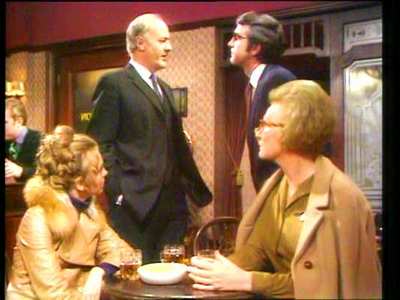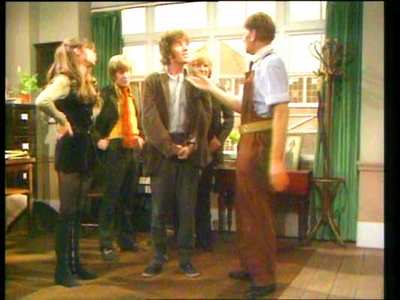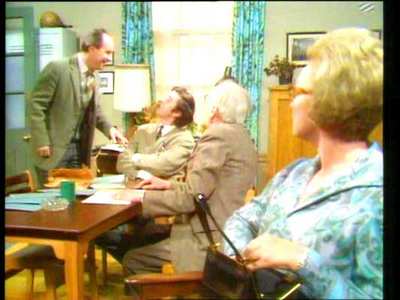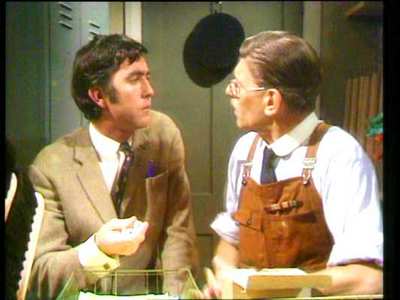Review of Please Sir, The Complete Third Series
Introduction
ITV comedy has never stood up particularly well against its BBC counterpart. There are very few ITV comedies in the same league as (say) Dad`s Army, Steptoe and Son, and Porridge. Please Sir is, however, head and shoulders above the usual ITV comedy fare and is one of the few series that - if it had been shown on BBCtv would surely have been a regular in the schedules.
Created by Good Life scribes John Esmonde and Bob Larbey, the show is proof positive that pedigree is everything. Whether or not the show was influenced or inspired by the 1967 movie To Sir With Love (which featured Sidney Poitier teaching a bunch of London kids including Lulu) is academic. To be honest the show shares more with Carry On Teacher. Esmonde and Larbey had gone to school together and their shared experiences were vivid enough memories to form the basis of the series.
The show was largely limited to three standing sets - Class 5C, the staff room and the headmaster`s study. Exterior sequences were shot on 16mm and inserted as appropriate into the videotaped action.
John Alderton played wide-eyed innocent straight out of teacher training college Bernard Hedges. Cast by then-head of entertainment at LWT Frank Muir, the role was the making of Alderton`s career and he has never looked back. Derek Guyler played the school janitor Norman Potter, basically the same character as Guyler`s character of Corky, Eric Sykes`s neighbourhood copper. Potter was an old Desert Rat who liked to think he had seen off Rommel single handedly. Guyler had originally been cast as the headmaster, a role that passed to Noel Howlett who had cornered the market in headmasters and clergymen. His Morris Cromwell was a magnificently vague character, typical of that old-fashioned schoolmaster who conjugates Latin verbs for his own amusement or quotes the Aeneid.
Joan Sanderson was latterly best known as the old dragon from that episode of Fawlty Towers - "What did you expect to see from a Torquay hotel bedroom window? The Hanging gardens of Babylon?" The part of Doris Ewell, formidable deputy head of Fenn Street Secondary Modern was previously her signature role, and one that made her the dragon of choice of the 1970s. In her mid fifties when the show began, her career took off as a result of playing Miss Ewell, even though other roles she played were less rounded.
Richard Davies played Welshmen throughout the 1970s to the extent that he and the incomparable Talfryn Thomas were virtual "rentataffs", top of the casting director`s list if a Welshman was required. Both, of course, were far more accomplished comedy actors and Davies` Maths and Science teacher Price was fiercely Welsh, world-weary and cynical. He could always be relied upon to deflate Bernard Hedges` idealism before it got him roped into more work. Rounding off the staff, veteran character actor Erik Chitty played the desperately past-it sports master Smith. A figure of affectionate sympathy, Smithy was obviously way past retirement age but nobody had the heart to suggest he left the school. Series Three underlined his frailty with an episode where he collapses in the street. The pupils race to his aid.
Hedges` class 5C was the other focus of the show, a lairy, lippy bunch of not-so-youngsters who always had a smart answer for Hedges or some crazed scheme to make money, or get laid. Malcolm McFee played Peter Craven, one of those smart kids who wastes his time at school because he`s decided he knows it all and he will do anything to stop the rest of the class learning anything. Peter Cleall played jack-the-lad Eric Duffy, another know-it-all but this was based on charm and the gift of the gab rather than smarts. He was always after the girls, especially Sharon (Penny Spencer). Maureen, played by Liz Gebhardt, had an enormous crush on Mr Hedges and when in series three he gets engaged, she takes refuge in a plan to take the vows and become a nun. David Barry played Frankie Abbott, a gormless youth who lived in a fantasy world of old gangster movies and a desire to be a private eye - at least until his mum called him in for tea. The central group of kids was rounded off by the academically challenged Dennis Dunstable (Peter Denyer), a likeable, somewhat pathetic character who came from a poorer-than-most background and was regularly beaten up by his father.
The fourth series, screened in 1971, introduced a whole new bunch of youngsters and failed miserably to reproduce the magic of the first three series.
The actors and actresses playing the pupils made less of an impression beyond Fenn Street than the school`s staff. Most of those who have continued in the business have either concentarted on the theatre or writing. Malcolm McFee and Liz Gebhardt are sadly no longer with us. Having left Fenn Street School, all of the 5C crowd (with the exception of Penny Spencer who was replaced by Carol Hawkins) joined the Esmonde and Larbey-penned spinoff The Fenn Street Gang which ran to three series and 47 episodes.
Remarkably for a 1970s comedy series and possibly unmatched in some of the classic BBC series mentioned above, Please Sir included (admittedly limited) character arcs in its storylines. Series Three carried a thread throughout the run about Hedges` pending nuptials to Penny (Jill Kerman), a second one about Dennis Dunstable`s future prospects and a third about Maureen`s rebound from her crush into the nearest convent.

Video
Presented in the original 1.33:1. Please Sir was shot on a combination of studio-bound videotape and location 16mm. The 16mm, telecined into the episodes at the time of production, and including the regularly used main title footage, shows a quite woeful amount of dirt. The studio sequences exhibit typical 1970s camera/videotape properties - very flarey highlights and an overall softness of image. Having said that, the episodes (with the exception of one monochrome episode which has a few digital videotape artefacts) stand up surprisingly well quality-wise simply because they have so seldom been seen since their initial transmission. No restoration has apparently been attempted.
The last two episodes of series three and the Christmas Special were affected by the ITV Colour Strike of 1970-1 when technicians refused to use colour equipment in a disagreement over pay. As a result, the three episodes in question were made in black-and-white (or more precisely recorded with the chroma signal switched off). Comparatively few viewers would have actually noticed, as in 1970 the take-up of colour television in the UK was in its infancy. It is surprising viewing the monochrome episodes that detail is apparently higher than with the contemporary colour episodes.

Audio
Dolby Digital 2.0 Mono

Features
Just the 1970 Christmas Special "Everybody Came Too" which sees Hedges and Penny tie the knot. No subtitles

Conclusion
A surprising treat - a show that if anything is better than I remember from the time (mind you, I was only eight). Written by Good Life scribes John Esmond and Bob Larbey and starring one of the strongest ITV sitcom casts of the late 1960s-early 1970s, this show is a genuine classic and it is particularly pleasing to see it having the chance of getting a new audience with these releases.
Your Opinions and Comments
Be the first to post a comment!